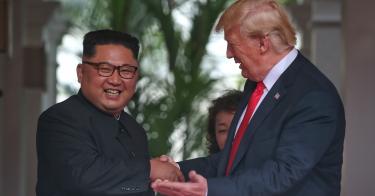The Singapore Summit was a missed opportunity to make progress on human rights issues in North Korea. While the issue was raised at the meeting, subsequent comments by President Trump have revealed that he prioritizes denuclearization over human rights. Indeed, he has now even downplayed some of the serious abuses he so powerfully condemned in this year’s State of the Union address, in his speechbefore the South Korean National Assembly, and at his Oval office meeting with North Korean refugees.
Mr. President, this is not the time to forget about the suffering of the North Korean people.
Over the next several months, the U.S. will likely enjoy a new opening with North Korea. The administration should use that opportunity to push for progress on previously intransigent issues, like human rights. Pressing for human rights should not be viewed as a distraction or as detracting from forward movement on nuclear security goals. It can actually help advance them.
It can be difficult to grasp the enormity of human rights abuses in the Hermit Kingdom. A United Nations commission of inquiry reportconcluded the situation is without parallel in the modern world, with between 80,000 and 120,000 people enduring horrible conditions in prison camps. The Committee for Human Rights in North Korea believes that at least 400,000 individuals have already perished in these camps.
These are likely conservative estimates.
North Koreans living outside the camps also face severe restrictions on basic freedoms, from speech, to association, and to religious practice.
In Singapore, President Trump had an historic opportunity to tell Kim Jong-un that there are real risks to continuing its abusive practices.
While the administration appears to have highlighted the persecution of Christians in North Korea (and rightly so), it stopped well short of communicating that no world leader can be viewed as legitimate so long as he unjustly imprisons tens of thousands in deadly camps and routinely deprives his countrymen of fundamental human rights.
But since returning from the summit, President Trump’s commentshave cut in the opposite direction, giving undue credence to a dictatorial leader whose chief goal for the summit was to gain legitimacy from the international community.
No selfies with prime ministers, escapades at Marina Bay Sands, or handshakes and meetings with the leader of the free world can erase Kim’s horrific track record of human rights violations.
The administration missed a potentially paradigm-shifting opportunity to make certain elements of U.S. engagement with North Korea contingent on Kim discontinuing egregious rights abuses. It’s a shame, but the June 12th summit does not have to be the end of the story.
At a press conference immediately following the summit, President Trump said he intends to continue discussing human rights concernswith Kim “at the appropriate time”— either in Pyongyang or Washington.
Hopefully, these future discussions will pick up on the commitment in the newly inked joint statement to “establish new U.S.–DPRK relations in accordance with the desire of the peoples of the two countries for peace and prosperity.” This new era should be marked by authenticity and a willingness to address even the thorniest of issues, including serious rights abuses.
One potential starting point is to press to give humanitarian organizations like the International Committee of the Red Cross, the World Food Programme, or United Nations agencies access to the most vulnerable populations in the prison camps. Another would be to work with Pyongyang to expand the North Korean people’s access to information about the outside world. While these steps may seem small, they could be the springboard to downstream discussions on ways to bring North Korea into the 21st century, eventually transforming the nation into a rights-respecting country.
Just as U.S. nuclear negotiators don’t expect the North to denuclearize overnight, the international community cannot expect North Korea to instantaneously abandon all human rights abuses. But if negotiators are not willing to address human rights issues in concert with the nuclear negotiations, the prospect for improvements will never draw closer. The time for bold action was on June 12, and with that missed opportunity comes consequences. But that doesn’t mean there is no opportunity left.
As the leader of the free world, President Trump can be a powerful voice advocating for the people of North Korea—people who had no representative at the summit, and no influence over their leaders in Pyongyang. He appears to have lost his voice since Singapore. Let us hope he can find it again, soon.
This piece originally appeared in Forbes https://www.forbes.com/sites/oliviaenos/2018/06/25/dont-let-kim-jong-un-ignore-human-rights/3/#1b34bde56f38



